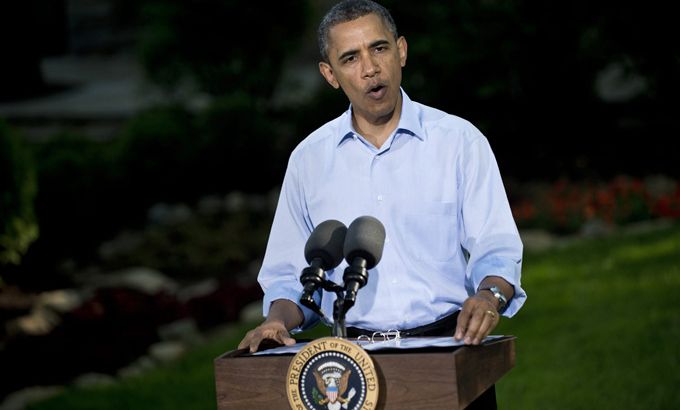Obama says eurozone crisis threatens world
US president wraps up G8 summit by saying more must be done to promote growth and job creation as potential remedies.

US President Barack Obama, wrapping up the Group of Eight leading economies summit he hosted at Camp David, has said that the eurozone crisis is a threat to the world economy but welcomed Europe’s new focus on jobs and growth as a potential remedy.
“The direction the debate has taken recently should give us confidence,” Obama told reporters on Saturday at the end of the high-level meetings in rural Maryland. “There is now an emerging consensus that more must be done to promote growth and job creation right now in the context of these fiscal and structural reforms.”
Keep reading
list of 4 itemsManipur’s BJP CM inflamed conflict: Assam Rifles report on India violence
Marcos Jr treads fine line with China as Philippines deepens US, Japan ties
Singapore’s economy misses forecasts with 2.7 percent growth
Obama said the G8 leaders recognised the painful sacrifices people in Greece are making to cope with the country’s economic problems, and repeated his view that Europe had the capacity to meet its challenges.
Earlier, the leaders said in a communique that it was “their imperative” to promote growth and jobs to revive the global economy, and gave their backing to Greece remaining in the eurozone.
“We agree on the importance of a strong and cohesive eurozone for global stability and recovery, and we affirm our interest in Greece remaining in the eurozone while respecting its commitments.
“Against this backdrop, we commit to take all necessary steps to strengthen and reinvigorate our economies and combat financial stresses, recognising that the right measures are not the same for each of us,” the communique said.
‘Interconnected economy’
Al Jazeera’s Patty Culhane, reporting from Washington, said: “This is such as an interconnected economy, that problems in Europe can affect the US as well, and as it is an election year it is important for Barack Obama to ensure Europe sorts it out.”
It was unusual for the often-bland G8 communique to single out a small nation. But fears that a political stalemate in
Greece would lead to the Mediterranean country leaving Europe’s monetary union at unknown costs to the financial system have prompted steep falls on global markets.
Opening the morning session, a shirt-sleeved Obama promised to seek ways to restore healthy growth and jobs and address concerns in Europe.
Flanked by the other leaders, he indicated a balanced approach was needed as “part of an overall package that all of us have to pursue in order to achieve the kind of prosperity for our citizens that we’re looking for”.
The G8 summit took place against the backdrop of new French President Francois Hollande’s emergence as a champion for growth-led recovery and the looming prospect that Greek voters could decisively reject austerity measures at the country’s forthcoming elections.
While Germany, the Europe’s largest economy, has so far imposed strict austerity measures on struggling eurozone members as the price for international loans, critics say those policies have fuelled rampant unemployment, brought Greece to the verge of bankruptcy and deepened crises in Italy and Spain.
After an early morning bilateral meeting with Obama, David Cameron, the British prime minister, said he detected a “growing sense of urgency that action needs to be taken” on the eurozone crisis.
“Contingency plans need to be put in place and the strengthening of banks, governance, firewalls – all of those things need to take place very fast,” he told reporters.
He said Merkel was “absolutely right” that every country needed to have in place strong plans for dealing with their deficits.
‘Fully’ supplied
Hours before welcoming the participants, Obama met Hollande and threw his weight behind France’s demand for pro-growth policies in Europe.
|
Inside Story Americas – Does the G8 represent a modern world economy? |
Obama said the two agreed that tackling the eurozone crisis was “an issue of extraordinary importance, not only to
the people of Europe, but also to the world economy”.
Also on the summit agenda were concerns about oil and food
prices as well as Afghanistan, Iran, Syria and North Korea.
G8 leaders vowed on Saturday to ensure oil markets were “fully and timely supplied” to ensure that tough new sanctions coming into force against Iran did not send energy prices soaring.
In what one official called an “unusual” statement, the G8 said it would keep a close watch on supplies and would ask
the International Energy Agency to take action if the situation demanded.
The Camp David summit kicked off four days of intensive diplomacy that will test leaders’ ability to quell unease over
the threat of another financial meltdown as well as plans to wind down the unpopular war in Afghanistan.
After the Camp David talks, Obama hosts a two-day NATO meeting in Chicago at which the war in Afghanistan will be the central topic.